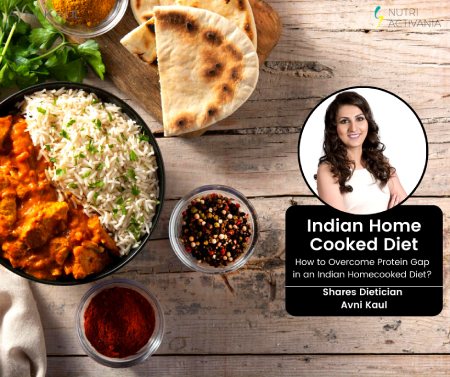Leading Dietician Avni Kaul Shares Insight on Protein Gap and Indian Homecooked food
Proteins are one of the vital components of a healthy diet. They are usually referred to as the building blocks of the body because they play a crucial role in muscle maintenance, skin, hormones, and all body tissues. But studies have indicated that most Indians are protein deficient. When one talks about the protein gap in Indian meals, quality is the problem, not quantity, says Dietician Avni Kaul
The hurdle is that the Indian diet tends to be quite cereal-focused. While cereals such as aloo, wheat, and rice alone may meet the protein quantity, the quality of protein stays a big challenge.
While everyone is aware of the essence of protein for good health, not many are aware that the current Indian meals are lacking in the quality of protein. Consuming a carbohydrate-heavy meal does not satisfy the requirement of all essential amino acids. Thus, it is crucial to balance the daily meals with not merely quantity of protein but quality as well.
Leading weight loss expert and Dietician, Avni Kaul says combining cereals besides pulses helps to complete the essential amino acid profile in a vegetarian diet while a non-vegetarian meal lends essential amino acids through eggs and meats.

Protein is very important for your body. There are numerous factors that make protein vital. They are:
- Building a healthy, strong body
- Repairing damage
- Digesting food
- Supplying oxygen
- Regulating hormones
Food sources for protein
Protein is usually, found in pulses, millet, and cereals, dairy products such as milk and curd, nuts, and non-vegetarian foods such as egg, meat, and fish.
How much protein is needed?
An adult typically needs 54g of protein per day as per the ICMR RDA report, 2020. Population-based surveys in India such as NSSO (2011-12) suggest that Indians do consume this much amount regularly in their diet. So, the real problem is the poor-quality protein.
Kind of proteins that one needs
Protein is formed up of 20 amino acids, and the body can form 11 of these 20. It means that the remaining nine should come from food. These 9 remaining amino acids are essential amino acids.
Complete proteins provide all essential amino acids, which cannot be made by your body.
- Food items such as milk, egg, meat, and soya are examples of complete protein.
- The majority of plant foods (except soya) lack one essential amino acid.
For instance, cereals are deficient in lysine (an essential amino acid), and pulses lack methionine. Data indicates that Indians consume cereals the most amongst any other food groups, both in urban and rural India. Although the RDA for protein is met, the protein is of inadequate quality as cereals are incomplete proteins.
What can you do to fill the gap in protein?
Protein deficiency in quantity remains the topmost myth in nutrition history. It is the quality where one needs interventions to solve the actual amino acid gap. Lysine remains the critical protein building block which could be a gap filler as cereals lack Lysine and Indians consume majorly cereals.
Diversifying your diet and having all the important food groups that are a part of Indian thali remains to be the topmost solution for the Indian diet. Have those portions of curd/chaas/milkshakes/paneer, dal, nuts, and omelets. Add nuts and seeds to your salads, and smoothies as they have not just the quantity but also the quality of the protein you need.


